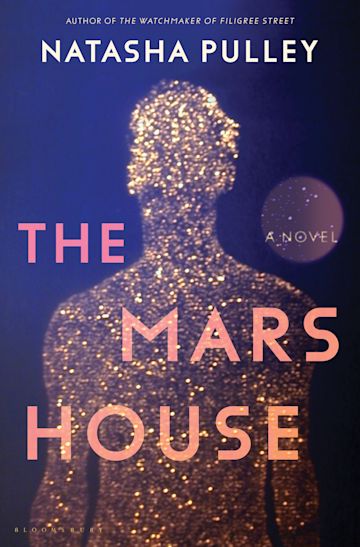The Mars House: A Novel
- By Natasha Pulley
- Bloomsbury Publishing
- 480 pp.
- Reviewed by Mariko Hewer
- April 11, 2024
This queer, outer-space romance speaks to the human condition here on Earth.

With the ever-increasing worry about climate change and its devastating effects, it can be difficult to read a book whose premise relies on our planet becoming uninhabitable. Although it concerns exactly that, Natasha Pulley’s queer sci-fi romance, The Mars House, nevertheless offers hope for the future of mankind, even if that future takes place on another planet.
January Sterling is a former ballet dancer who, along with many others, has fled Earth’s worsening ecological crises for the Mars colony of Tharsis. Having chosen not to “naturalize,” or have his body modified to accommodate Mars’ weaker gravity, January is required to wear a heavy cage when in public; his muscles, strong from being acclimatized to Earth’s thrice-as-powerful gravity, are otherwise a grave danger to those around him. Barred from most jobs, January grimly subsists in “what had once been a nuclear reactor’s cooling tower. The refugee agency promised it wasn’t radioactive.”
When a chance encounter with Senator Aubrey Gale, a Mars-born politician in favor of forced naturalization, goes terribly wrong, January finds himself having to examine his dislike for Gale’s policy in greater depth. Gale, realizing their verbal attack on January has backfired — those born on Mars use they/them pronouns — offers January a five-year marriage contract designed to help them both overcome their problems.
By marrying, January (who is struggling to survive on the meager benefits of the only job open to him as an “Earthstronger,” or unnaturalized person) will have access to wealth and be allowed to remain physically unchanged. And Gale, for their part, will signify their sympathy for the Earthstrong plight without having to actually change their position on the issue of naturalization.
In their own ways, both January and Gale enter the arrangement terrified of the other. Gale, who has been attacked by Earthstrongers, fears January’s physical strength, while January is by turns awed and disgusted by the resources available to Gale at a time when Earthstrong refugees are floundering on Mars:
“[January] hoped there was a special place in hell for politicians who pretended to be friendly with normal people.”
As they spend more time together, however, the Earth refugee and the Mars native find they share a surprising number of commonalities. While Gale does support forced naturalization, they see it merely as the best among a slate of bad options, and January comes to feel grudging respect for the complex calculations Gale must make. Similarly, watching January dance in Gale’s practice studio and talking to him about the difficulties he’s endured on Mars give Gale a more nuanced understanding of their new spouse’s history and hardships.
Still, there are moments of chaos and uncertainty between them, some tinged with grim humor. At one point, Gale’s security team reflects incredulously on how dangerous it is that January, who has “spent some time in Texas,” is allowed access to the senator’s inner circle.
Poignantly, after straining to make himself understood to a member of Gale’s team, January “pressed his hands over his eyes and wished there was a way to translate properly. He couldn’t help thinking that that was most of the problem between Earthstrongers and naturalized people. People could say the same words, but they meant such different things.”
Soon, January and Gale are forced into a united front when an unknown menace threatens the entire colony. In addition, massive waves of refugees from Earth are making their way through space, seeking a new home at the very time that home is on the brink of destruction.
As Gale and January come into increasingly close contact and must rely on one another for solutions to these escalating problems, they discover their shared humanity and even, despite their best efforts, some other things they have in common. Eventually, they’re forced to decide whether they trust each other enough to work together to save themselves, their loved ones, and all of Tharsis.
Mariko Hewer is a freelance editor and writer. She is passionate about good books, good food, and good company. Find her occasional insights at @hapahaiku.

